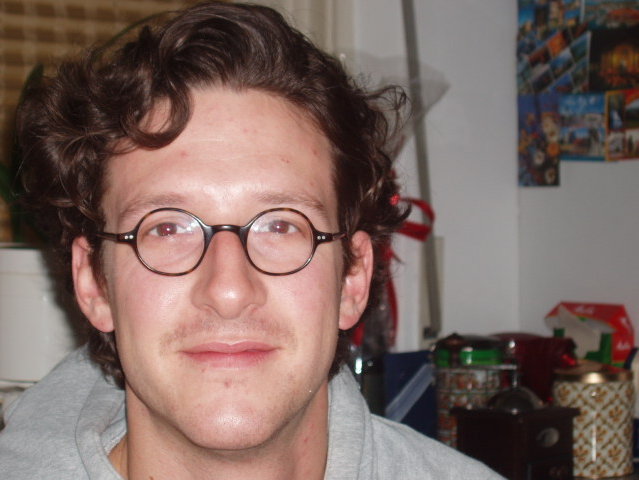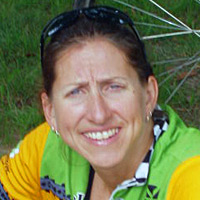AUGSBURG, Germany -- I bicycled into Augsburg, which is a little seedy from the start. Maybe it's the day, as the weather is overcast and rainy.
It's difficult to maneuver through the city of Augsburg because of all the trains, trolley tracks and the traditional cobblestones in the heart of the downtown.
My goal is to get to Dachau; but I've bicycled through the weekend and am needing a break. My brother is usually relieved when I finally hit the wall as it makes me finally seem human.
Although I bike and bike I can't get out of the armpit that is Augsburg. Stopping at a bicycle shop I ask about camping or a youth hostel and nothing is close.
Finally I cut two blocks off the main drag and find Heilig Geist, the Holy Spirit church and a wonderful man by the name of Ernesto Rizzuto takes me in for the night.
Ernesto is 27 years old, studying law, and living at the church with Father Albert, who in some way is a cousin related to his mother.
Ernesto helps with the church service, corrects papers at the neighboring university and within two weeks will enter the monastery.
"It's just going to be for two months, to see if I have the calling," said Ernesto, who is more than looking forward to the experience of living in a community with 40 other men.
Father Albert, who is a big, jovial man much like Archbishop Timothy Dolan, and is trying to keep Ernesto focused. "He told me to not rush into a decision with the church; finish law school and then see how I feel."
Ernesto explains the monastery as a community that operates without producing and consuming. "It just works at a different rhythm," he said talking about the daily two hours of private reading, time spent in prayer and working.
"If you're a farmer you farm, if you're good with numbers you help with the banking," he said clarifying that all their needs are met and they just keep a basic perspective on what they want versus what they need.
"Yes, I can have a cell phone and access to the Internet, but I probably won't use it a lot," said Ernesto who is also free to leave the monastery and travel, but he'd have to get permission.
He said the hierarchy at the monastery depends on your date of entry. It is also possible to completely change your mind and leave. "Only you have to ask permission to leave and if you go, you get nothing," he said.
"You can't say, I worked this much and you owe me these Euros. You go with nothing."
Today's tidbits ...
At the Holy Spirit church I'm staying on the third floor of the neighboring rectory. The building is huge with dark, wood floors, high ceilings, lots of big floor plants and obviously religious pictures and books are at every turn.
My room is up a long flight of creaky stairs; there's no hiding when you have to go downstairs to the bathroom at night.
I lay down for a nap at 5 p.m. and wake up at 7 ... the next morning. Ernesto makes me breakfast of coffee and bread with orange jam. He said he's normally an early riser because it takes him two hours to contemplate the day and then get going.
Made it to Dachau and the information bureau gives me directions to the prison camp. Marguarite at the information desk pushes two folders of other tourist sites, obviously the camp from the 1934 is what everyone comes to see but they say Dachau has so much more.
Some of the interesting things about the prison camp:
The camp is located on the outside of Dachau and around it are the most fast food restaurants, stores and shopping centers I've seen since I've been in Germany.
The prison camp is also the place where I've found the most Americans: students from California, a family from Boston and another couple from California also touring Germany by bike for two weeks.
Entering the prison camp you walk past the two-story gatehouse from 1937. Prisoners arriving at the camp walked through the same tunnel and through the metal gate with the inscription "Arbeit macht frei" which means work brings freedom.
A black and white poster depicts a life-size photo of prisoners standing on Roll Call Ground, June 28, 1938. The prisoners had to assemble every morning and evening and stand motionless for an hour. Sometimes even the dead had to be brought to roll call to be counted. Sick and weak prisoners collapsed during roll call.
In the final months before liberation large transports of prisoners arrived in Dachau and were brought first to the camp. Many of the sick and exhausted died.
The Nazi regime used Dachau as more of an execution site. Several hundred fighters and political opponents were deported to camp solely for execution.
Many medical experiments were performed on prisoners including biochemical experiments on treatment of infected wounds, altitude experiments and survival in marine distress.
A video of the prison camp draws a large crowd as teens watch shots panning hollow-eyed prisoners and boney bodies being stacked in piles outside in the yard at the camp.
An excerpt from a speech in 1965 by State Minister Dr. Alois Hundhammer: "The dead can not be brought back to life, but the entire camp, complete, is preserved in a dignified form as a large memorial that shall serve to remind and warn the coming generations."
Judy is a Milwaukee native who is ever exploring the country. Her favorite mode of travel is her 21-speed, blue Centurion bicycle, which she bought after high school. Judy has worked in the local media for the past 20 years. "I need to do something to support my biking habit."
Judy has an extensive history in radio news, having worked at WISN, WUWM, WTMJ, WKTY in La Crosse and WBKV in West Bend. A strong interest in sports also had Judy reporting for ESPN Radio covering the Packers, Buck, Brewers and Badgers. "One of my first Brewer games at County Stadium the security guy yelled as I walked into the locker room LADY IN THE LOCKER ROOM. Now its so commonplace. But that story makes me sound really old."
Judy is currently working at WISN-TV in Milwaukee. She is a freelance writer and her pieces have been seen in The Small Business Times and The Business Journal. Her travel journal has appeared in Minnesota Trails Magazine, The Statesman and the West Bend Daily News, to name a few.
Aside from biking, running and being active in her community, Judy is known as someone who is "very, very thrifty." "I get candles for Christmas. My friends call them my space heaters because I normally keep the heat in my house at 40 degrees during the winter. Its not that I cant afford to turn up the thermostat, I just hate paying for heat."
Judy said her "conservative attitude" plays a part in her bike tours ... not needing to pay for gas and frequently spending nights camping inside churches. "First of all, it makes me feel safe since Im traveling alone and second all youre doing is sleeping, so why pay for that. Its no wonder I cant ever get someone to travel with me."
Judy grew up in Whitefish Bay and graduated from Dominican High School and the University of Wisconsin-Milwaukee. Judy is the second oldest among seven siblings and spends a lot of her time working as a "park tester" along with her eight nieces and nephews.




